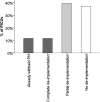International survey of De-implementation of initiating parenteral nutrition early in Paediatric intensive care units
- PMID: 31196076
- PMCID: PMC6567488
- DOI: 10.1186/s12913-019-4223-x
International survey of De-implementation of initiating parenteral nutrition early in Paediatric intensive care units
Abstract
Background: Initiating parenteral nutrition (PN) within 24 h in critically ill children is inferior to withholding PN during the first week, as was found in the PEPaNIC study. The aims of this study were to investigate de-implementation of early initiation of PN at PICUs worldwide, and to identify factors influencing de-implementation.
Methods: A cross-sectional online survey was conducted (May - October 2017), consisting of 41 questions addressing current PN practices, the degree of de-implementation, and factors affecting de-implementation.
Results: We analysed 81 responses from 39 countries. Of these 81 respondents, 53 (65%) were aware of the findings of the PEPaNIC study, and 43 (53%) have read the article. In these 43 PICUs, PN was completely withheld during the first week in 10 PICUs, of which 5 already withheld PN (12%), and 5 de-implemented early initiation of PN (12%). Partial de-implementation was reported by 17 (40%) and no de-implementation by 16 (37%). Higher de-implementation rates were observed when the interpreted level of evidence and grade of recommendation of PEPaNIC was high. Predominant reasons for retaining early initiation of PN were concerns on withholding amino acids, the safety in undernourished children and neonates, and the long-term consequences. Furthermore, the respondents were waiting for updated guidelines.
Conclusions: One year after the publication of the PEPaNIC trial, only two-thirds of the respondents was aware of the study results. Within this group, early initiation of PN was de-implemented completely in 12% of the PICUs, while 40% asserted partial de-implementation. Increasing the awareness, addressing the intervention-specific questions and more frequently revising international guidelines might help to accelerate de-implementation of ineffective, unproven or harmful healthcare.
Keywords: De-implementation; Intensive care units, pediatric; Nutritional support; Parenteral nutrition; Questionnaire; Survey.
Conflict of interest statement
The authors declare that they have no competing interests.
Figures




Similar articles
-
Impact of withholding early parenteral nutrition completing enteral nutrition in pediatric critically ill patients (PEPaNIC trial): study protocol for a randomized controlled trial.Trials. 2015 May 1;16:202. doi: 10.1186/s13063-015-0728-8. Trials. 2015. PMID: 25927936 Free PMC article. Clinical Trial.
-
Outcomes of Delaying Parenteral Nutrition for 1 Week vs Initiation Within 24 Hours Among Undernourished Children in Pediatric Intensive Care: A Subanalysis of the PEPaNIC Randomized Clinical Trial.JAMA Netw Open. 2018 Sep 7;1(5):e182668. doi: 10.1001/jamanetworkopen.2018.2668. JAMA Netw Open. 2018. PMID: 30646158 Free PMC article. Clinical Trial.
-
Early versus late parenteral nutrition in critically ill, term neonates: a preplanned secondary subgroup analysis of the PEPaNIC multicentre, randomised controlled trial.Lancet Child Adolesc Health. 2018 Jul;2(7):505-515. doi: 10.1016/S2352-4642(18)30131-7. Epub 2018 May 11. Lancet Child Adolesc Health. 2018. PMID: 30169323 Clinical Trial.
-
PN Administration in Critically Ill Children in Different Phases of the Stress Response.Nutrients. 2022 Apr 27;14(9):1819. doi: 10.3390/nu14091819. Nutrients. 2022. PMID: 35565787 Free PMC article. Review.
-
Early Supplemental Parenteral Nutrition in Critically Ill Children: An Update.J Clin Med. 2019 Jun 11;8(6):830. doi: 10.3390/jcm8060830. J Clin Med. 2019. PMID: 31212639 Free PMC article. Review.
Cited by
-
Early versus later initiation of parenteral nutrition for very preterm infants: a propensity score-matched observational study.Arch Dis Child Fetal Neonatal Ed. 2022 Mar;107(2):137-142. doi: 10.1136/archdischild-2021-322383. Epub 2021 Nov 18. Arch Dis Child Fetal Neonatal Ed. 2022. PMID: 34795009 Free PMC article.
-
Early versus late parenteral nutrition in term and late preterm infants: a randomised controlled trial.BMJ Paediatr Open. 2024 May 12;8(1):e002579. doi: 10.1136/bmjpo-2024-002579. BMJ Paediatr Open. 2024. PMID: 38735834 Free PMC article. Clinical Trial.
-
Delayed Macronutrients' Target Achievement in Parenteral Nutrition Reduces the Risk of Hyperglycemia in Preterm Newborn: A Randomized Controlled Trial.Nutrients. 2023 Mar 4;15(5):1279. doi: 10.3390/nu15051279. Nutrients. 2023. PMID: 36904278 Free PMC article. Clinical Trial.
-
The Japanese Critical Care Nutrition Guideline 2024.J Intensive Care. 2025 Mar 21;13(1):18. doi: 10.1186/s40560-025-00785-z. J Intensive Care. 2025. PMID: 40119480 Free PMC article. Review.
-
Nutritional support for children during critical illness: European Society of Pediatric and Neonatal Intensive Care (ESPNIC) metabolism, endocrine and nutrition section position statement and clinical recommendations.Intensive Care Med. 2020 Mar;46(3):411-425. doi: 10.1007/s00134-019-05922-5. Epub 2020 Feb 20. Intensive Care Med. 2020. PMID: 32077997 Free PMC article. Review.
References
-
- Fivez T, Kerklaan D, Mesotten D, Verbruggen S, Joosten K, Van den Berghe G. evidence for the use of parenteral nutrition in the pediatric intensive care unit. Clin Nutr 2017 Feb;36(1):218–223. PubMed PMID: 26646358. Epub 2015/12/10. eng. - PubMed
-
- Kerklaan D, Fivez T, Mehta NM, Mesotten D, van Rosmalen J, Hulst JM, et al. Worldwide survey of nutritional practices in PICUs. Pediatr Crit Care Med 2016;17(1):10–18. PubMed PMID: 26509815. Epub 2015/10/29. eng. - PubMed
-
- Koletzko B, Goulet O, Hunt J, Krohn K, Shamir R, Parenteral nutrition guidelines working G 1, et al. Guidelines on Paediatric parenteral nutrition of the European Society of Paediatric Gastroenterology, hepatology and nutrition (ESPGHAN) and the European Society for Clinical Nutrition and Metabolism (ESPEN), supported by the European Society of Paediatric Research (ESPR). J Pediatr Gastroenterol Nutr 2005;41 Suppl 2:S1–87. PubMed PMID: 16254497. Epub 2005/10/29. eng. - PubMed
-
- Mehta NM, Compher C, Directors ASPENBo. A.S.P.E.N. clinical guidelines: nutrition support of the critically ill child. JPEN J Parenter Enteral Nutr 2009;33(3):260–276. PubMed PMID: 19398612. Epub 2009/04/29. eng. - PubMed
MeSH terms
Grants and funding
LinkOut - more resources
Full Text Sources
Molecular Biology Databases

